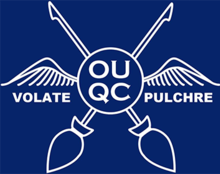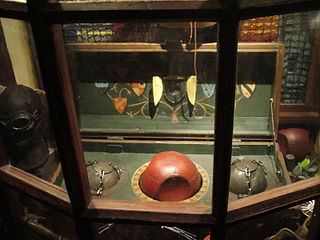
Quidditch is a fictional sport invented by author J. K. Rowling for her fantasy book series Harry Potter. It first appeared in the novel Harry Potter and the Philosopher's Stone (1997). It is a dangerous but popular sport played by witches and wizards riding flying broomsticks.
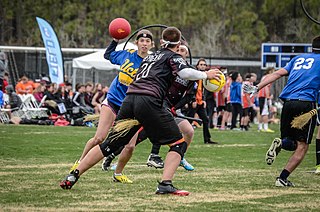
Quidditch, also known as quadball since 2022, is a team sport that was created in 2005 at Middlebury College in Vermont, United States, and was inspired by the fictional game Quidditch in the Harry Potter books by the author J. K. Rowling. Two teams of seven players each, astride broomsticks and opposing each other on a rectangular pitch, compete with the primary objective of passing a ball through the defenders' hoops, while preventing their opponents from passing it through their own hoops. The real-world sport is sometimes referred to as "muggle quidditch" to distinguish it from the fictional game of the books, which involves magical elements such as flying broomsticks and enchanted balls — a muggle in the Harry Potter series being a person without magical abilities. The sport is played around the world.

The International Quidditch Association (IQA), also known as the International Quadball Association, is the governing body for the sport of quidditch. It was founded as the Intercollegiate Quidditch Association in 2009 following the very first intercollegiate quidditch match. In 2010, the IQA added the "international" term to its name, and 2016 saw its induction as an international sports federation with its creation of the Congress. It now comprises more than ten national associations governing quidditch in their respective nations.
The British Quadball Cup, also British Quidditch Cup, is a quidditch tournament held in the United Kingdom that follows the rules laid out by the International Quidditch Association. It is organised by QuadballUK and is the largest UK tournament of the year.

QuadballUK is the official governing body of quadball in the United Kingdom and is affiliated with the International Quadball Association.

The US Quadball Cup, previously known as US Quidditch Cup, is a quadball tournament held in the United States and organized by US Quadball. The first US Quidditch Cup was held in 2007, and the tournament features collegiate and club teams from the United States. The tournament was formerly known as the IQA World Cup, but that name now refers to the international championship IQA World Cup.
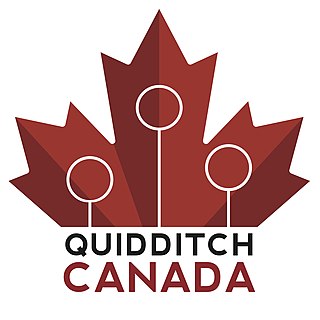
Quidditch Canada is the governing body that oversees quidditch within Canada under its mother organization, the International Quidditch Association. In August 2022, QC announced plans to rebrand with the new name Quadball in 2023.

Quidditch Nederland, formerly known as Muggle Quidditch Nederland, is the official governing body of the sport quidditch in the Netherlands, and affiliated with the International Quidditch Association and its European Committee. Quidditch is a sport which combines elements of handball, dodgeball, and rugby, and is derived from the fictional sport of the same name from the Harry Potter series. Its current president is Marit Epskamp, and the vice-president is Jori Noordenbos. Quidditch Nederland, then Muggle Quidditch Nederland, was founded in 2014 by Jerona van der Gevel and Bram Vries as part of Quidditch Benelux.

The United Kingdom National Quidditch Team, colloquially known as Team UK, was the official national Quidditch team of the United Kingdom. Team UK made its debut in 2012 at the IQA Summer Games in Oxford, UK where it placed 5th of 5 teams. The team then played in Canada at the 2014 IQA Global Games in Burnaby, BC on July 29, 2014 where it placed 4th of 7 teams and in the European Games in Sarteano, Italy in July 2015, placing 2nd of 12. Team UK gained its first medals at the IQA World Cup 2016 in Frankfurt on July 23–24, 2016, finishing 3rd out of 21 teams. In 2017 the team gained its first international trophy, winning the IQA European Games, beating France in the final. Team UK's final tournament appearance was a 3rd place medal at the 2019 IQA European Games in Bamberg.

Belgian Quidditch Federation, or BQF, is the governing body of quidditch in Belgium. It was founded in 2012 as a Facebook page to garner interest from potential players and teams within Belgium and began to take shape in 2013 with the introduction of its first two teams: Deurne Dodo's and the Brussels Qwaffles. The organisation began to take shape as a non-profit in early 2014 with the formation of the newly-international International Quidditch Association in the form an international federation. Belgian Quidditch Federation maintains one delegate within the IQA Congress as a member of Quidditch Europe alongside Quidditch Nederland (QNL) and the Luxembourgish Quidditch Federation (FLQ). On 10 October 2014, BQF changed its name from Belgium Muggle Quidditch to its current name to better integrate with other sports in the country.

The Canadian national quidditch team made its debut in 2012 at the IQA Summer Games in Oxford, UK, where it placed 4th of 5 teams. The team once again represented Canada at the 2014 IQA Global Games in Burnaby, BC on July 29, 2014 where it took third place, coming behind the United States and Australia, respectively.

The European Quidditch Cup, also known as EQC and formerly as the European Quidditch Championship, is the culminating championship tournament for the sport of quidditch in Europe. It began to be legitimised in 2014 when the International Quidditch Association became an international federation for quidditch. The first tournament took place in 2012 in France as quidditch began to develop across Europe. Today, the tournament is the highest level of championship in Europe besides the European Games with league-level tournaments being the qualifying competitions. In 2019, Division 1 of EQC was held in Harelbeke, Belgium, where the Paris Titans won the championship for the fourth time in their history.

The IQA World Cup is an international quidditch tournament contested by the national teams of the members of the International Quidditch Association, the sport's global governing organisation. The championship, which was named Summer Games and Global Games in its first two editions, has been awarded every two years since 2012. The current champions are the United States, who defeated Belgium in 2018.

Quidditch is a growing team sport in Canada. Due to its relative youth within the sports scene of Canada, adoption is not as widespread as other sports such as rugby or ultimate. However, adoption is picking up with additional university and community teams each year. As a result of its inclusivity and its many niche styles of play, a wider spectrum of individuals are drawn to this sport than other mainstream sports. For the moment, the majority of teams are based in Ontario, Quebec, British Columbia and Alberta, but teams are rapidly starting up in Saskatchewan, Nova Scotia and Manitoba. Quidditch Canada is the governing body for the sport across the country; there are no associations within Quidditch Canada that govern provincially/territorially.
The IQA European Games (EG) are the biennial games for the sport of quidditch held in Europe where national governing bodies send national teams to compete. The European Games were created in response to the IQA World Cup, the biennial tournament wherein nations from around the world compete in a similar style to the FIFA World Cup. Both Games alternate years so in the off years regional tournaments such as the European Games or the Asian Quidditch Cup can occur. These games are the highest level of championships in quidditch aside from Global Games. The 2015 champions were Team France, narrowly beating Team UK.

The 2015 IQA European Games, also known simply as the European Games, was the inaugural European championship for the sport of quidditch organized jointly by Sarteano2015, Quidditch Europe and the International Quidditch Association. The tournament was held the weekend of the 24–26 July 2015 in the city of Sarteano, Italy. France took first against the United Kingdom with a final score of 90*–50, and Norway came in third winning 150*–80 against Belgium.
The Northern and Southern Cups are the two major regional quidditch tournaments of the United Kingdom. Organised by QuadballUK, the tournaments serve both as qualification prerequisites for other tournaments, such as the European Quidditch Cup and the British Quidditch Cup alongside being their own stand alone tournaments. Regionals are often considered the most important tournaments of the year after the British Quidditch Cup and they serve as qualifiers for the latter tournament. Those teams that fail to qualify for BQC each season compete in the Development Cup instead. From 2021 onwards the tournaments have been held as a series of one-day fixtures exclusively for university teams with the equivalent Community League tournament held for community teams.
The United States national quidditch team is the official quidditch team of the United States. The team is regulated by US Quidditch and is a national member of the International Quidditch Association. The team has won the most IQA World Cup titles, winning the 2012, 2014, and 2018 titles. The USNT only competes in events once every two years; at the IQA World Cup, as it is geographically ineligible for the only other current international Quidditch event; the IQA European Games.
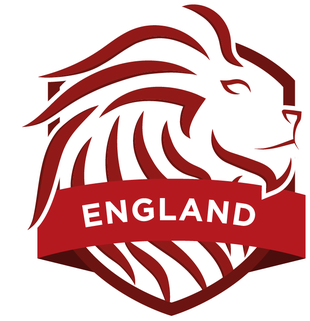
The English national quadball team is the official national quadball team of England. The team, which is organised by QuadballUK, was founded in 2021 after the splitting of Team UK into separate teams for each of the individual home nations. They made their debut at the 2022 IQA European Games in Limerick, winning the tournament.

The Scottish national quadball team is the official national quadball team of Scotland. The team, which is organised by QuadballUK, was founded in 2018 and made its tournament debut at the 2019 IQA European Games in Bamberg.
